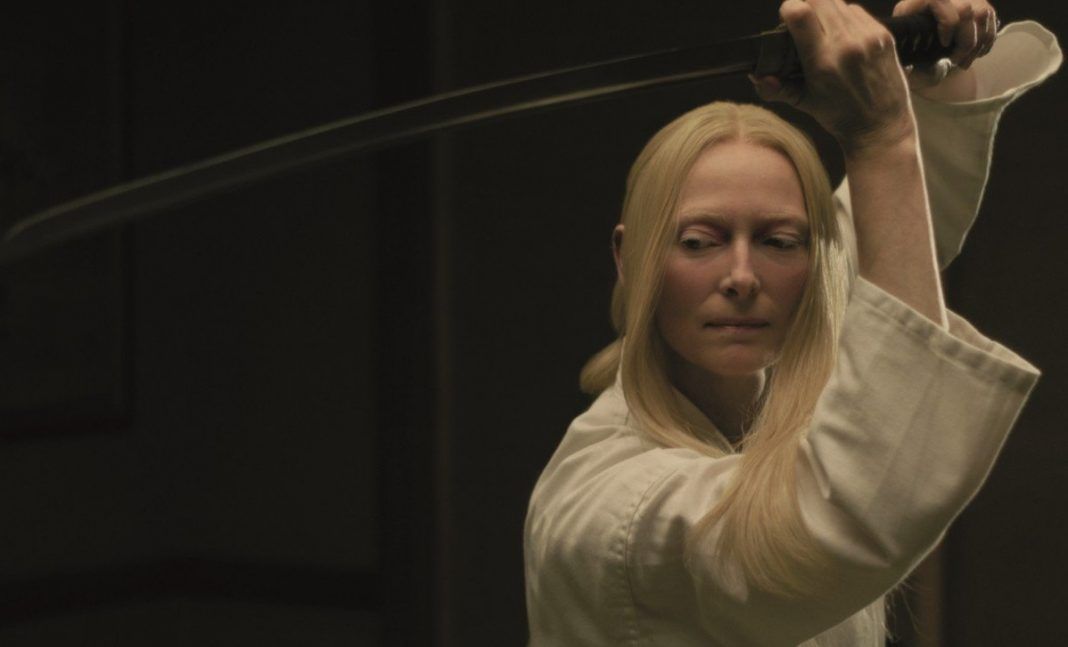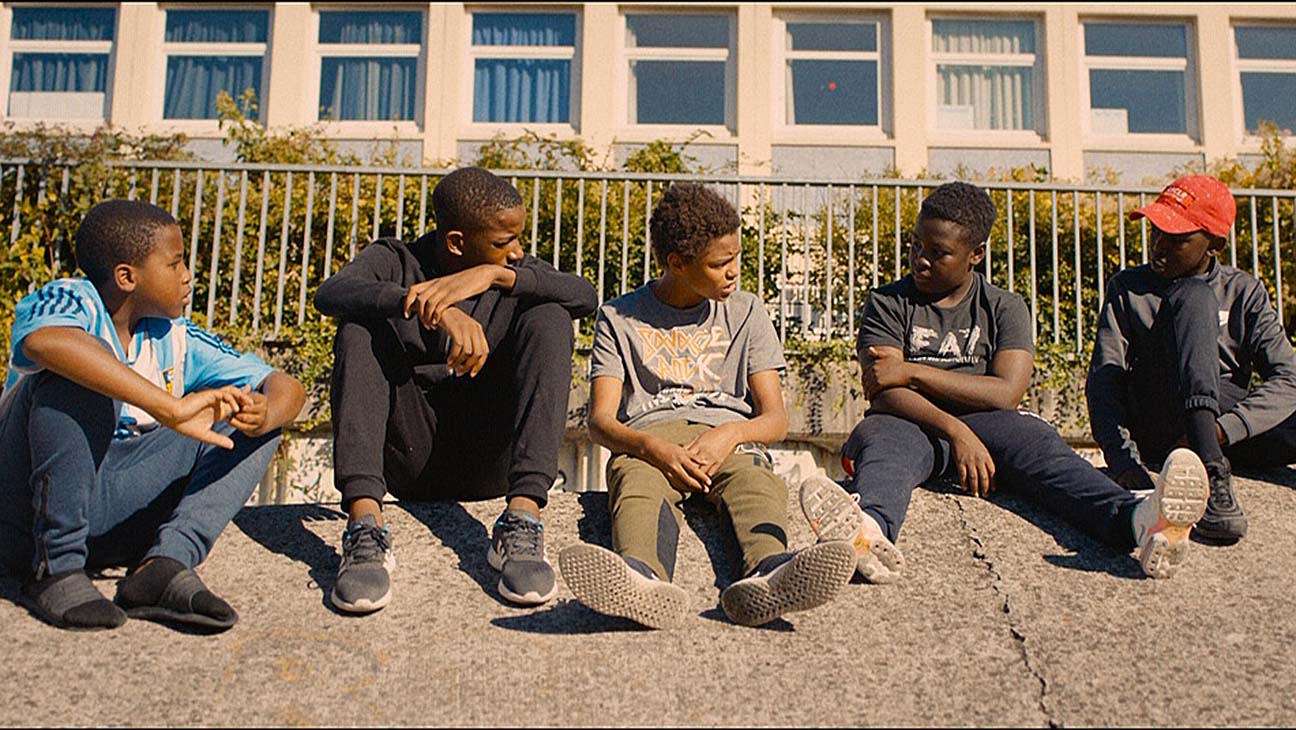
The 72nd Cannes Film Festival is humming along with plenty of films, stars and even a political message or two as with “Les Miserables” that reminded people poverty is still very much alive all over the world. Actress Tilda Swinton talks about why she chose to play a samurai in the Jim Jarmusch zombie film “The Dead Don’t Die.”
Tilda Time
Tilda Swinton feels most at home at the Berlin Film Festival, but she’s steadily become a regular at the Cannes Film Festival.
“I’m racking them up,” she says cheerfully the day after the premiere of Jim Jarmusch’s zombie movie “The Dead Don’t Die.”
“I like this summer-holiday feel. These are wonderful family reunions,” Swinton said in an interview at Cannes’ Carlton Hotel. “If I’m with Jim Jarmusch, I’m with the Jim team. If I’m with Bong Joon-ho, I’m with the Bong team. If I’m with Wes Anderson, I’m with the Wes team. You’re having a summer holiday with your friends on the beach. It’s sort of silly. I like the silliness of it.”
But Swinton is nostalgic for one aspect of the festival that has waned in recent years: “the Troma-ness of Cannes,” she says, alluding to the once ubiquitous Troma Entertainment, the aggressively promotional indie factory of low-budget exploitation movies.
“You don’t get assaulted by people dressed up like life-sized penises like you used to,” says Swinton. “That used to be great.”
“The Dead Don’t Die,” which is competing in Cannes for the Palme d’Or, isn’t a Troma film by any stretch. But it shares some genre DNA. Jarmusch’s film is about a small town named Centerville where “polar fracking” alters the Earth’s rotation and the undead begin to walk the streets. Swinton, who memorably starred as a thoroughly well-read vampire in Jarmusch’s “Only Lovers Left Alive,” plays the town’s mortician.
“At some point at the end of our adventure with ‘Only Lovers Left Alive,’ Jim said, ‘Let’s do a zombie movie next,’” she recalls. “He said, ‘What do you want to be?’ I said, pretty much off the cuff, ‘I want to be the funeral director who’s put out because the dead don’t die.’ That was it. He laughed and went away. And then all the rest, he did.”
For even Swinton, the character is an eccentric one. She speaks with a pronounced version of her own Scottish accent and is a master swordsman. Swinton, finally, is zombie-killing Scottish samurai warrior.
“I’ve very proud of that body count,” she says, smiling. “I love it.”
There are winking references throughout the often meta “The Dead Don’t Die” to the actors themselves — among them Bill Murray, Adam Driver and Chloe Sevigny. Swinton’s character is named Zelda Winston, a riff on Jarmusch’s nickname for Swinton: “Swilda Hinson.”
“Everybody’s in their own clothes,” she says.
As purposefully outlandish as much of the movie is, its premise — where the planet is horribly damaged and a strange new-normal takes hold — doesn’t sound far-fetched to Swinton.
“It could easily be a documentary, if we’re not careful. We’re getting used to really bad things happening that we couldn’t imagine,” she says. “We’ve just all got to retain perspective. It’s so easy to become befuddled. And it’s so easy to notice that some forces are actively befuddling us.”
Swinton recently narrated Mark Cousin’s “Women Make Film: A New Road Movie Through Cinema,” a four-hour documentary (for which 12 more hours are planned) that sheds light on many of the underappreciated female filmmakers from throughout cinema history. Speaking to reporters Wednesday, Swinton referenced that past as an important perspective in today’s gender equality struggles.
“Women have been making films for 11 decades now,” she said. “There are countless films out there. Why don’t we necessarily know about them? We have women filmmakers. Some are working in bars, some are still in school, some can’t get into school. But that’s where we need to start. We need to look at the canon, appreciate it, stream it. Then it will exist amongst us.”
One new addition to that canon may be Joanna Hogg’s “The Souvenir.” The film, which opens in U.S. theaters Friday, stars Honor Swinton Byrne, Swinton’s daughter, in her film debut. Swinton plays her mother. Hogg’s widely acclaimed film — a second part of which is planned — is drawn from her own experience as a film student, her own deferred coming-of-age of a filmmaker.
“What she’s doing has such a purity,” says Swinton. “She started making her own films 20 years after making films as an assist director in TV. Because of experiences of these films, she didn’t have the confidence to be an author and yet she’s hit the ground running.”
Swinton, ever loyal to her directors, will be back in Cannes for the premieres of Bong Joon-ho’s “Parasite” and Quentin Tarantino’s “Once Upon a Time in America.” Next year, she says she hopes to return again with “Memoria,” from Thai director Apichatpong Weerasethakul.
Les Miserables Brings Poverty To Cannes
More than 150 years after Victor Hugo’s classic novel, a French film titled “Les Miserables” gives a gritty, modern view of the Paris suburbs where Jean Valjean first met Cosette.
Ladj Ly’s “Les Miserables,” which premiered Wednesday at the Cannes Film Festival, contains no singing or romance, but rather a tough, “The Wire”-like street-level portrait of the Parisian banlieue of Montfermeil. It’s the same neighborhood where the 37-year-old Ly grew up and still lives.
Ly says he made his movie as “an alarm bell” for the plight of kids growing up in neighborhoods like Montfermeil.
“For the past 20 years, we’ve said things are not going well. We have the impression no one’s listening,” said Ly. “I wanted to address a message to Emmanuel Macron, the president of the Republic. It’s important for him to see the film.”
“For 20 years now, we have been yellow vests,” he added, referencing the ongoing protests of working-class French. “We’ve been demanding our rights for the past 20 years. We’ve had to cope with police violence for over 20 years.”
“Les Miserables,” which is competing for the top Palme d’Or prize in Cannes, shows the Paris suburbs as a combustible powder keg, where neighborhood gang leaders and overanxious police are in a constant dance. Much of Ly’s film revolves around the young kids growing up in the housing projects.
In 2015, the Paris banlieue of Clichy-sous-Bois exploded in riots that put an international spotlight on the lives of immigrants and French-Africans in the areas surrounding Paris.
“One shouldn’t forget that three-fourths of the people who live in these housing estates are French,” said Ly. “Now we have the impression that there are different classifications of citizenship. But we’re just French full stop, so accept us as French, full stop.”
Other recent films have sought to capture the reality of the banlieues, including “La Haine” and “Dheepan,” which won the Palme d’Or in 2015. “Les Miserables,” Ly’s feature directing debut, drew largely strong reviews in Cannes for its muscular genre work and passionate social commentary.
“One century later, misery, abject poverty is still present in these housing estates,” said Ly.


